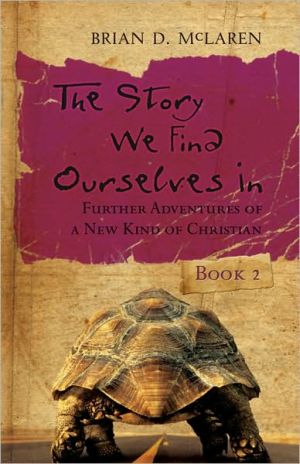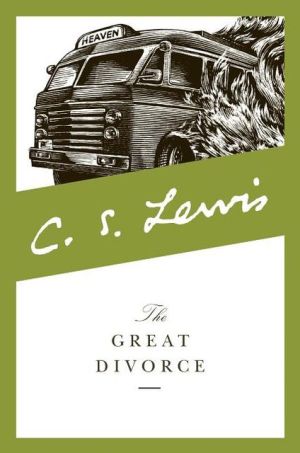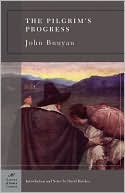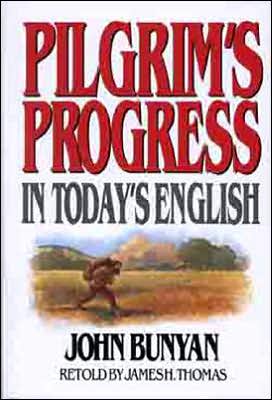Story We Find Ourselves In: Further Adventures of a New Kind of Christian
After many years as a successful pastor, Brian McLaren has found, as more and more Christians are finding, that none of the current strains of Christianity fully describes his own faith. In The Story We Find Ourselves In — the much anticipated sequel to his award-winning book A New Kind of Christian— McLaren captures a new spirit of a relevant Christianity, where traditional divisions and doctrinal differences give way to a focus on God and the story of God's love for this world. If you are...
Search in google:
In The Story We Find Ourselves In, Brian McLaren’s much anticipated sequel to award-winning A New Kind of Christian, he captures a new spirit of a relevant Christianity, where traditional divisions and doctrinal differences give way to a focus on God and the story of His love for this world. If you are searching for a deeper life with God this delightful fictional tale will provide a picture of what it could mean to recapture a joyful spiritual life.Publishers WeeklyMcLaren's A New Kind of Christian set the evangelical community abuzz in 2001 by exploring weighty ideas about faith through the vehicle of fiction. In his gentler follow-up, which intentionally reads more like an extended conversation than a gripping novel, McLaren brings back as protagonists pastor Dan Poole and spiritual guru (and now certified naturalist and tour guide) "Neo" (Neil Oliver). "Sometimes, I think the Bible is more of a question book than answer book; it raises questions that bring people together for conversation about life's most important issues," muses Neo. Using the device of Neo conversing with spiritual seekers, including an Australian woman who is battling cancer, McLaren tackles age-old questions about Christianity, including, "Before the beginning, what was God doing?" The conversations discuss the relevance of other religions, the authenticity of miracles and the work of Christ on the cross. The backdrop of the Gal pagos Islands provides Neo the opportunity to discourse on creation, evolution and a Christian's responsibility to care for the planet. McLaren's characters' awe of Neo can be wearing at times, as when Dan reflects, "What Neo explained next was so fascinating that I could hardly sit still." McLaren tends to overuse parentheses-there are seven sets on a single page-and some portions of text feel inserted, rather than well-integrated. However, like the first volume, this book offers an excellent opportunity for Christians to rethink why they believe what they believe. (Mar.) Copyright 2003 Cahners Business Information.
The Story We Find Ourselves In\ Further Adventures of a New Kind of Christian \ \ By Brian D. McLaren \ John Wiley & Sons\ ISBN: 0-7879-6387-9 \ \ \ Chapter One\ TEARS ON MY NECK \ To: danpoole@backspring.com From: kellison@cdrc.ec Date: August 5, 2001 Subject: Request for help, urgent\ Dear Dan, It;s terrible after you havent heard from me for so long for me to finzlly email you aking a favr. This is rude of me inded but this is a favor th doing of which will also be a favor to you Im sure.\ A good friend of mine is coming to the DC area. It appears she has a rare form of cancer (relapse) that the National Institutes of Health is interested in trying tp treat. I wonder if you can vist her she has no friends in the area there.\ I told her about you an Carol and your three wonderful kids. Having NIH interested in your disease is not a good sign. She need some friends and probably doesnt have much time to make them (you understand, cancer very serious) You are one of the best I could offer. The fact that you are a m8nister of the gospel is no small advantage at a time like this in her life. (I could presume on Fr. Scott too but he has just retired and moved back to his hometown, Minnsota think?)\ I know you are busy, too many duties and demands already, but if I were in hospital with a bad prognosis I know you would be there for me, and if you visit this dear friend, I will consider it more precious to me than if I were the one being blessed by yourcom-any and suppor.\ Her name is Kerry Ellison from Australia but she lived in California for many years and is a U.S. citixen. Shell be arrive tomorrow. Shell foll you in about me and my current situati0n including why you havent hear from me in so long. I hope to come up and visit her and you to as soon as possle. I wanted to accompany her on the flight but as shell explain myown condition doesnt permit right now (not to worry).\ It extremely hard to get internet time here in the islands so Ill close with the assurance that you are in my prayers Daniel as is you family. No need respond as Im using Kerry's account just this once and wont be able to check for your reply.-Neo (Phil 1722)\ P.S. She arrives BWI American #1776 from Miami at 1122 p.m. Monday night and will take cab to hotel near NIH. She mets her doctors at NCI 9 am on Tuesday.\ It was a Sunday night, the evening air still warm and moist after a hazy, brutally hot, and humid Mid-Atlantic day. I was tired. For some reason though, I felt that I should check my e-mail before going to bed, something I normally avoid doing because it often keeps me up too late, and most things can be handled better the next morning anyway. I had just returned from leading the evening service at Potomac Community Church, where I serve as pastor.\ Those of you who have read the first account of my friendship with Dr. Neil Edward Oliver (whose friends always address him by his nickname, Neo, derived from his initials) can imagine how my eyes widened and my heart began to race as I realized who had sent me this e-mail. I remember slowly lifting my hands from the keyboard as I read, as if I were being arrested or held up.\ I hadn't heard from Neo since he left for a 'round-the-world voyage some eighteen months earlier, and had worried about him (and prayed for him) more and more as each month passed. Now, reading this message from him, I began asking myself a dozen questions about his whereabouts and well-being. (His reference to his "condition" was disconcerting-I reread it several times. Also, Neo normally was as meticulous in his spelling and grammar as he was in his dress, so the flood of typos in the message told me that he was writing in extraordinary circumstances.) The references to Miami and the islands made me think of the Bahamas, or some other Caribbean islands, and then (of course!), Jamaica-Neo's place of birth.\ By the time I ran downstairs to tell my wife, Carol, about this long-awaited contact from our friend, I had leapt from a hunch to a certainty: "Carol, Carol, wake up," I said, "I just got an e-mail from Neo in Jamaica."\ Carol is one of those Southern-born people who sounds sweet and acts civil even when she's being torn from sleep. "Neo ... an e-mail? Let me see, Dan!" She hopped out of bed, grabbed a robe, and beat me upstairs to my attic office.\ "There's nothing about Jamaica here that I can see," she began, leaning toward the computer screen, "but we'll have to set up the guest room for his friend. I reckon she must be terrified. Of course you'll pick her up at the airport, right?" Neo hadn't expected us to put up his friend, but of course we would.\ After a night of little sleep for either Carol or me, and after a Monday that seemed even longer than most, I arrived at the airport at 11:00 P.M., only to read "Delayed" on the screens that report the status of flights. At the American counter, I learned that the delay was due to tropical storm Chantal, twirling out in the Caribbean. The woman at the counter gave me my first doubt about my Jamaica theory as she explained that Flight 1776 was a continuing flight from Quito, Ecuador, with a stop in Miami. Ecuador? I remembered wondering what "ec" stood for in the return address of Neo's e-mail, and now at least I knew that piece of the puzzle.\ If you fly a lot, you know how these things go. It was 2:46 A.M. when Flight 1776 finally arrived. The last person off the plane was Kerry, being pushed in a wheelchair down the jetway and through the gate.\ Three things struck me immediately about Kerry. First, she was strikingly attractive. With her blue eyes, suntanned skin, and graying hair pulled back in a youthful ponytail, she reminded me of a woman whose name I couldn't remember, someone I'd seen in a National Geographic, that woman who worked with chimpanzees. (Later, I remembered the name, Jane Goodall, and the resemblance was stronger the more I thought about it, though Kerry was a bit taller.)\ Second, I could see on her face a dull tiredness or pain, even as she managed a smile at the attendant who was helping her to her feet and helping her get a bag over one shoulder and a cane into the other hand. She'd smile, and then wince, and then smile again-then another wince as she assured the attendant that yes, she could walk, yes, she was fine, thank you for your help.\ Third, as she stood, I noticed-there's no delicate way to say this-that she had no breasts. She wore jeans and a black T-shirt that revealed a chest as flat as any boy's, and before I could fully process what that meant, I was shaking her hand and introducing myself. As she dropped her cane and threw her arms around my neck, I could feel her ribs pressing against my chest. She started to cry.\ I felt her tears on my neck as she hugged me. "Neo told me you might be here," she said, "but I didn't want to get my hopes up. Thank you so much for ..." For some reason, I started crying, too.\ Then came a flood of apologies that the plane was so late, and more thanks for picking her up, and questions about a good hotel, and assurances from me that Carol and I insisted she stay with us and consider our home her new home. She had no baggage beyond the carry-on bag that kept slipping off her shoulder. I took it and slung it over my shoulder. The attendant was watching all this from a few yards away, and he now returned and invited Kerry to sit back on the wheelchair, and she accepted. We left the gate, proceeded down the long concourse, past security, through the automatic doors, and out onto the sidewalk, where the attendant again helped Kerry to her feet and said goodbye. The two of us slowly walked across the road to the parking garage, and we were home by 3:45. She mentioned our mutual friend briefly on the way home. "I promised Neo I'd give you a full report on how he's been doing, Dan, but we'll need a few hours for that. A few days would be more like it!"\ Carol was still awake when we arrived, and she and Kerry met with a warm embrace. There was no question of any further conversation; we needed to get Kerry to bed as soon as possible and save all talk for the next morning.\ But that wasn't to be. The next morning, we faced the pressure of fighting Maryland traffic to get our new friend to Bethesda for her intake at the National Cancer Institute at 9:00 A.M. In fact, it wasn't until that evening that Carol and I got a chance to talk with Kerry at length.\ That day, the kids needed Carol's help with their usual stuff (soccer practices, shopping), so I drove Kerry and then stayed at the hospital all day, waiting, reading magazines, doing a little work on my laptop, making a few calls on my mobile phone, visiting the candy machine a couple times in lieu of lunch. Carol joined me in the waiting room later in the afternoon. Kerry was almost finished with her tests, a nurse told us, and would be settled in her room by seven o'clock. Carol and I caught dinner in the cafeteria, and then cautiously entered Room 516. Kerry, sitting up in bed, eating her hospital dinner, welcomed us in.\ "Quite a day," she said, as we settled in the squeaky vinyl seats at the foot of her bed.\ "I can't imagine," Carol said. And with that, the conversation began and flowed until visiting hours ended at nine o'clock. It was kind of strange, but kind of natural too-as if we were already long-time friends, even though we hardly knew each other. We had immediate trust and warmth; now all we needed was the facts, which Kerry offered.\ She was fifty-one, a biologist employed at the Charles Darwin Research Center in the Galapagos Islands, six hundred miles west of Ecuador. She had first been diagnosed with breast cancer five years earlier, back in California. She had undergone a bilateral radical mastectomy, along with an experimental form of chemotherapy, and had been free of cancer ever since-or so she thought until a few days earlier. Her first symptom of relapse had been a slight but nagging pain in her left leg, and then a few days later, while snorkeling in the ocean, she felt something erupt inside her armpit. "It was as if a golf ball suddenly popped through my muscle and bulged beneath my skin," she said. "I couldn't put my arm down normally, and right away, I knew I was in deep trouble."\ She paused to glance at the IV tube hooked to her left forearm. "We immediately flew to Quito for some tests," she went on, leaving me wondering what kind of "we" she and Neo constituted. "The doctors in Quito talked to my oncologist in California, and they agreed that I needed care that I couldn't receive in Ecuador. Then my oncologist contacted NCI, and because my cancer is a very rare one, they agreed that I should come here, and Neo contacted you, and so ... here I am."\ In the back of my mind, I wanted to ask more about Neo, but with Kerry sitting there in her hospital gown, an IV dripping into her arm, it hardly seemed right to talk about anything else but her and her condition. She told us about the first day's tests, and what she had been told to expect in the next several days. (She'd be getting some strong chemo, and her hair would be gone within a week, for starters.)\ She was pleasant, and her accent was charming, and her eyes were sparkling and alive, but I kept noticing those subtle winces. And the tiredness in her face was unmistakable. When it was nearing nine o'clock and I suggested we let her get some sleep, she didn't quarrel. She just said, "Well, after that tardy flight last night, you must be wiped out too. I'm fine, and I'll never forget your kindness to me. You couldn't have been kinder. I feel bless-... uh, fortunate indeed."\ Her stumbling over the word "blessed" caught my attention-we pastors notice such things. Carol told her we'd be back the next day. And we were. In fact, either Carol or I or both of us visited almost every day for the next few weeks, not because we had to, but because we wanted to.\ Soon enough, Kerry began telling us about her friendship with Neo, and the story that brought her to that bed in that room in that hospital that first evening. The chapters that follow recount her story. When Neo arrived some weeks later, and when I, later still, met many of their mutual friends, I was able to supplement Kerry's recollections with those from her wider circle of friends and fill out the narrative in much more detail. Her story, and theirs, became entwined in the fabric of an even larger story into which my own life and yours too are also woven.\ (Continues...)\ \ \ \ \ Excerpted from The Story We Find Ourselves In by Brian D. McLaren Excerpted by permission.\ All rights reserved. No part of this excerpt may be reproduced or reprinted without permission in writing from the publisher.\ Excerpts are provided by Dial-A-Book Inc. solely for the personal use of visitors to this web site. \ \
\ Publishers WeeklyMcLaren's A New Kind of Christian set the evangelical community abuzz in 2001 by exploring weighty ideas about faith through the vehicle of fiction. In his gentler follow-up, which intentionally reads more like an extended conversation than a gripping novel, McLaren brings back as protagonists pastor Dan Poole and spiritual guru (and now certified naturalist and tour guide) "Neo" (Neil Oliver). "Sometimes, I think the Bible is more of a question book than answer book; it raises questions that bring people together for conversation about life's most important issues," muses Neo. Using the device of Neo conversing with spiritual seekers, including an Australian woman who is battling cancer, McLaren tackles age-old questions about Christianity, including, "Before the beginning, what was God doing?" The conversations discuss the relevance of other religions, the authenticity of miracles and the work of Christ on the cross. The backdrop of the Gal pagos Islands provides Neo the opportunity to discourse on creation, evolution and a Christian's responsibility to care for the planet. McLaren's characters' awe of Neo can be wearing at times, as when Dan reflects, "What Neo explained next was so fascinating that I could hardly sit still." McLaren tends to overuse parentheses-there are seven sets on a single page-and some portions of text feel inserted, rather than well-integrated. However, like the first volume, this book offers an excellent opportunity for Christians to rethink why they believe what they believe. (Mar.) Copyright 2003 Cahners Business Information.\ \








